

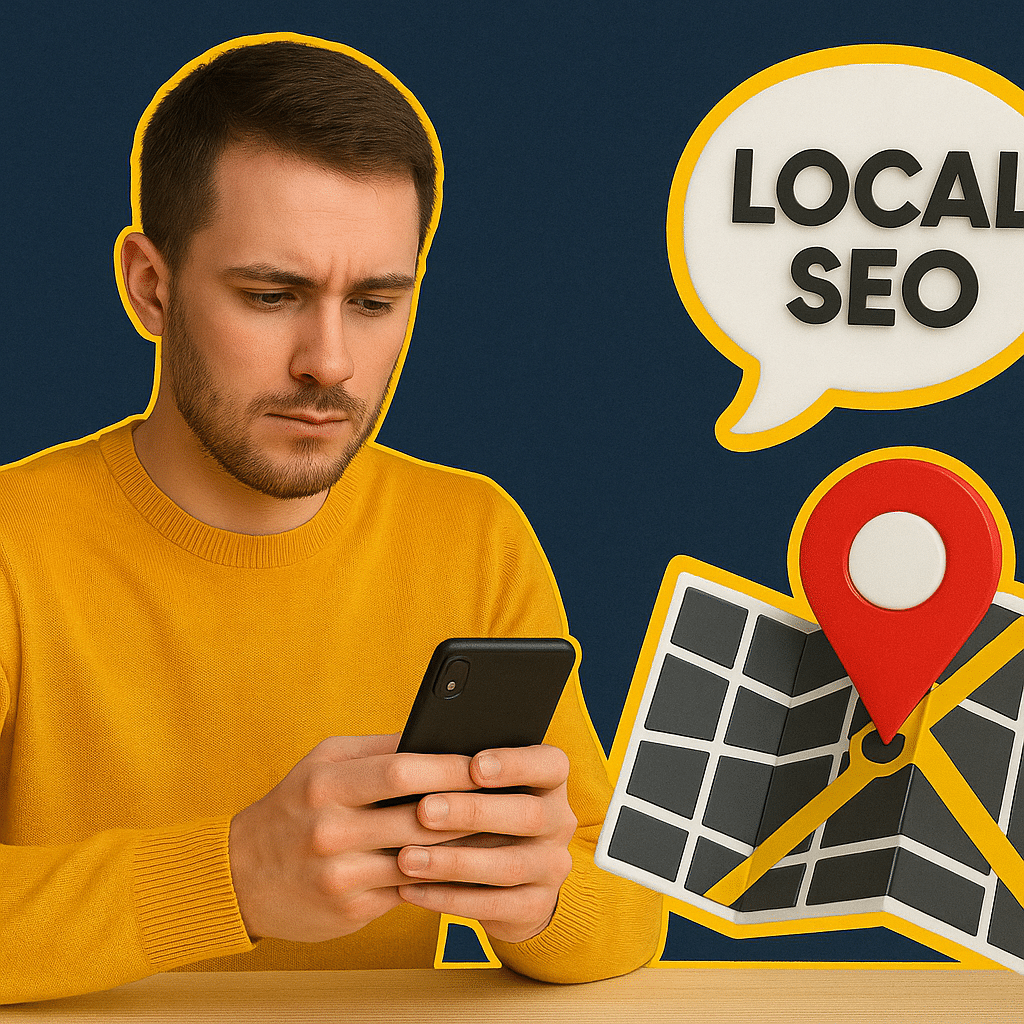
You run the best business in the area. It’s about time you’re crowned the boss of the block. The go-to name in town. The local legend. Deserved or not, that title doesn’t come without effort. You might be a hard worker on the ground, but you also need to try harder online.
So, let’s equip you for local SEO. Now more than ever, your presence on Google Maps, mobile search, and voice assistants has to match your physical one. You need to show up in the right place, at the right time, with the right details – or you’ll get closed by the guy next door.
Local SEO tools can be free and simple or advanced, automated, and pricy. Whether you’re a one-store local favorite or franchising hundreds of branches, we have a tool for you. Let’s take a look at the best local SEO tools across five categories to help you pick the right one.
First up is the “one-tool-to-rule-them-all” category, where by “all” I primarily mean local rank tracking, citation management, review monitoring, and performance reporting. These capabilities are crucial for local SEO, especially if you’re trying to be everywhere at once.
So if you’re managing multiple locations, this one is for you. These tools offer a central dashboard with dozens of features that cover local search from all angles. This centralized, holistic approach helps save time and makes it easier to spot what’s working and what’s not.
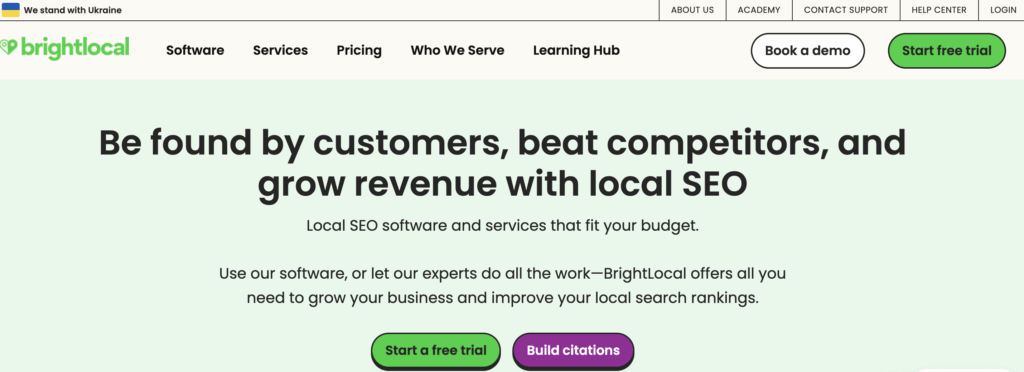
Best for: Multi-location businesses and agencies that need a complete solution for local SEO.
Key Features
Why It Stands Out
A strong contender for the brightest and most local tool in the SEO space, BrightLocal brings together key features for rankings, listings, and reputation management into one clean dashboard. This is a capable, feature-rich, and affordable tool that gets five stars for efficiency.
Agencies love BrightLocal for its white-label reports, while multi-location businesses appreciate that it delivers real-time clarity at the zip-code level. One location or one hundred, you can count on it for a clear view of each branch or client account – even as you scale.
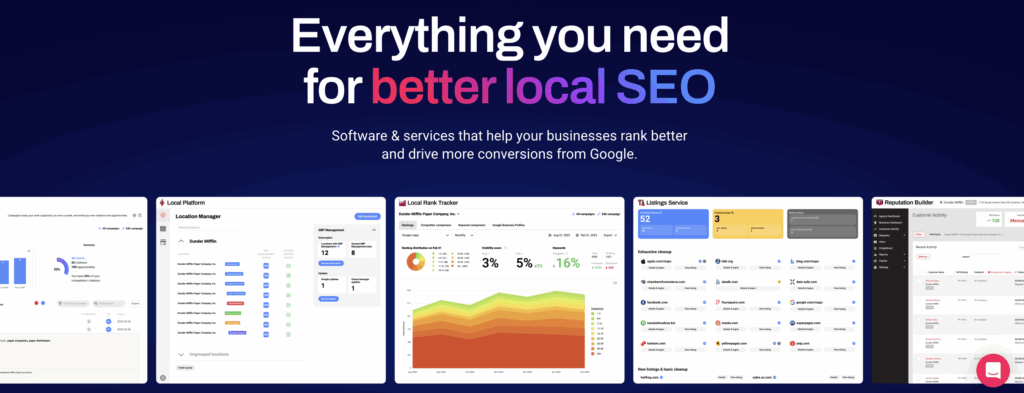
Best for: On-site service providers and SEOs who need hands-on control over citations and local rankings.
Whitespark started as a citation builder, and it’s still one of the best tools in that category. Why did I list it as a jack of all trades? Because it’s also a rank tracker and a really good reputation builder with insights by city or zip code that can help you spot gaps in your strategy.
Another strength of this solution, aside from precision and quality, is expert support: all citation services are fully managed by their in-house team. If you’re trying to make it in a busy local market, deep local expertise is more than welcome, and Whitespark is a safe choice.

Best for: Semrush users who want to boost their local SEO efforts.
Key Features
If you’re already using Semrush for SEO, Semrush Local is the natural next step. You can trust it to fold local listings, track rankings, and manage your reputation. No need to juggle tools or even switch tabs: tools for local SEO are plugged into a familiar UI and built for simplicity.
Could there be a neighborhood where they haven’t heard about you? The zip code-level rank tracking can help you find it. Then, it’ll monitor your reviews to make sure you’re welcome and accepted there. Semrush is just seamless for opportunity discovery and retention.
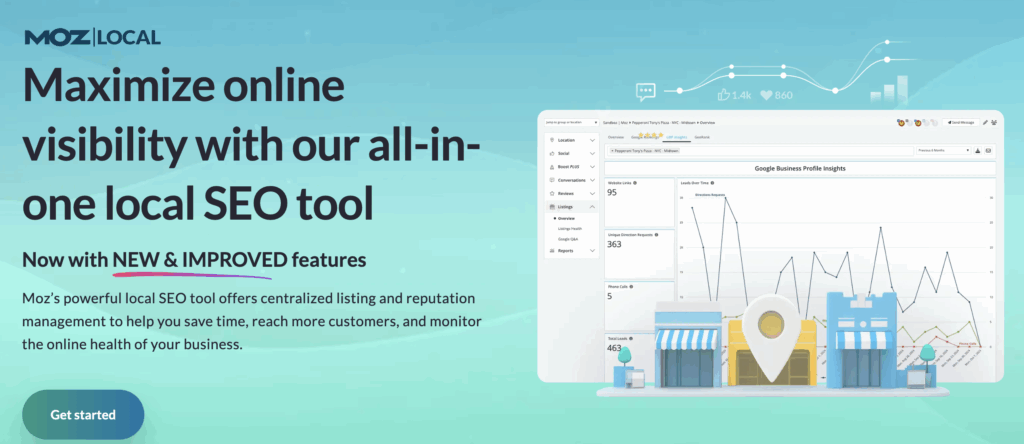
Best for: Brick-and-mortar businesses that want to put local listings and reputation management on autopilot.
Marketers don’t have time to chase down directories and fix bad data for hours; business owners have even less. It’s good that there’s Moz Local for that. It’s a great pick if you want your listings locked up and up-to-date without giving them a second more than you have to.
With Moz Local, you only need to enter your info once. The tool will take care of all the rest and keep it consistently updated across Google, Facebook, Yelp, and more. Clean and focused reporting is another plus, showing the real-world impact of your listings and reviews.
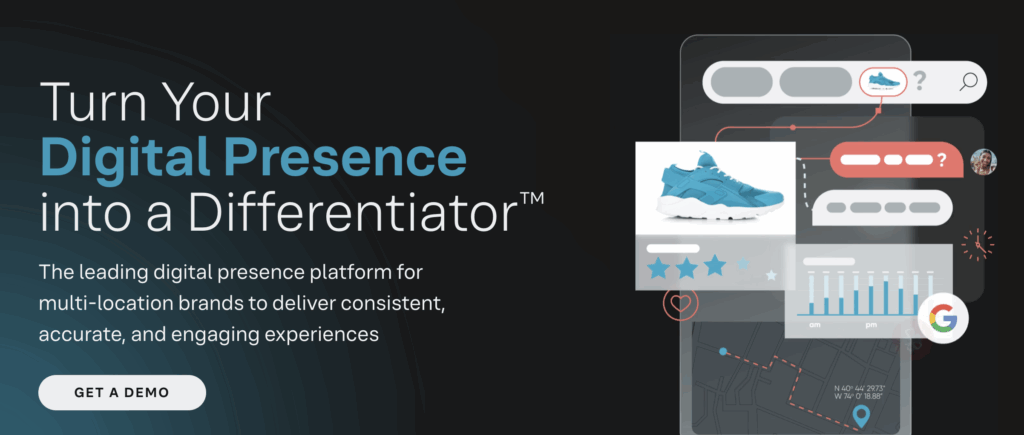
Best for: Enterprises and franchises that need full control over listings, reviews, and location data at scale.
For an enterprise-grade powerhouse of local SEO, look at Yext. Unlike the best local SEO tools designed for SMBs, this one goes beyond listings to help you own your location data wherever your customers are searching. Brands use Yext to cover every touch point from Google to Alexa.
The review and analytics dashboards are also built for scale – they will show you exactly what’s missing and what has to be improved. No matter how many locations you cover, the insights are always granular and specific. The only drawback? You don’t get all this for cheap.
If your sandwich shop is only tracking rankings at the city level, you’re missing a lot of hungry people. Local SEO can’t afford to stay high above the ground and look at the market from a bird’s eye view. It must go lower, zoom further, and spy on every street corner.
That’s why we have local rank tracking tools – to dive deeper underneath the generic keyword rankings and see how we’re doing in Google’s local pack, Maps, and mobile search results. Maybe even generate grid-based SEO heatmaps to scan areas where visibility drops.
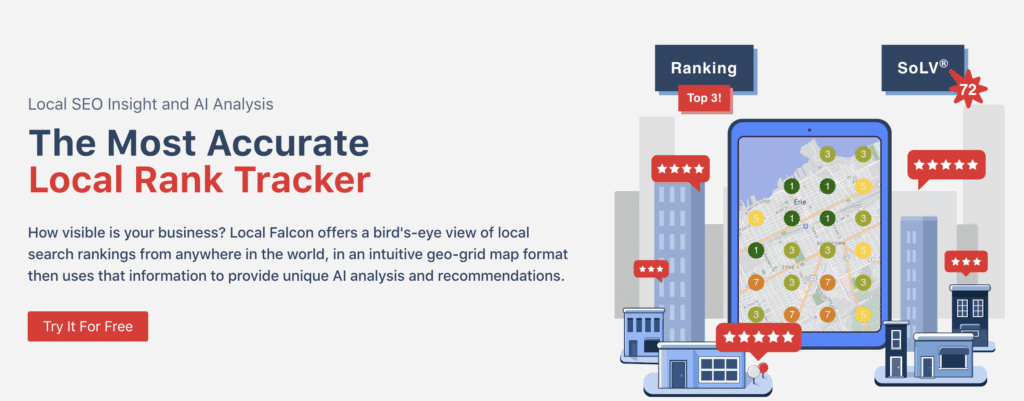
Best for: Agencies and businesses that want to visualize where they rank on Google Maps.
Even the best tools for local SEO can’t match Local Falcon’s X–ray sight. Instead of just telling you you’re number one “indie bookstore near me,” it shows where your readers are on a grid over your city map. You can zoom in to see how visibility changes from block to block.
This is not your everyday SEO, not even on a local level. It’s a superpower that lets you spot weak zones and plan hyperlocal SEO campaigns. If you think of Google Maps as a battleground, then Local Falcon is a perfectly positioned command center with no blind corners.
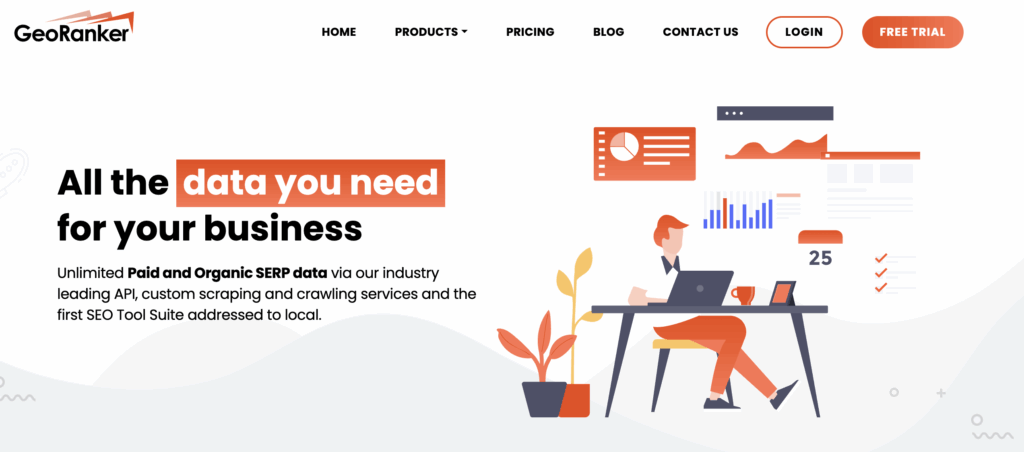
Best for: Multi-location businesses and SEO pros who need detailed location-based SERP data across cities and countries.
GeoRanker is the best local SEO software for data geeks. Like all tools in this category, it shows you where you rank. But what sets it apart is that it lets you zoom in, zoom out, and (this is really cool) compare performance across entire regions and specific locations.
Competitor research is another differentiator for GeoRanker. The local SERP checker gives live snapshots from hyperlocal zones, while the citation finder shows backlink opportunities – both can be used to creep up on competitors stealing your business in the area.
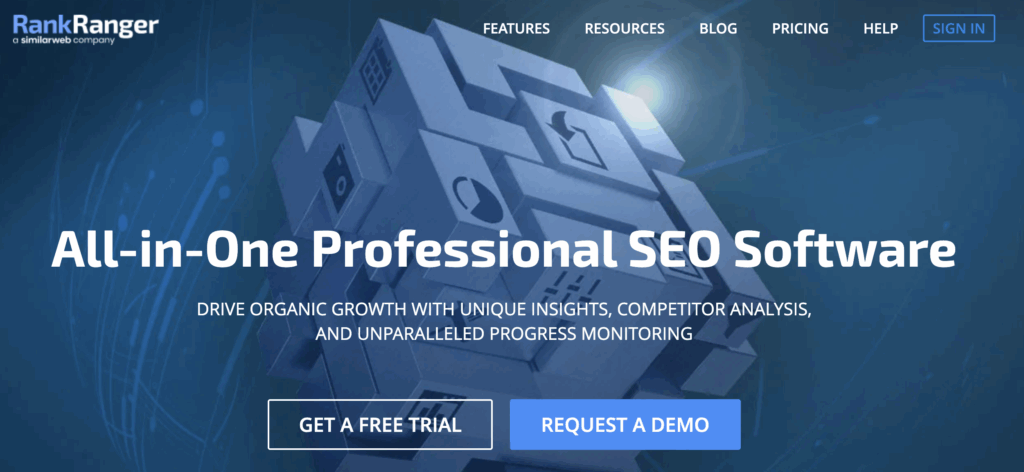
Best for: Agencies and SEOs who want customizable rank tracking with full local context.
RankRanger is a powerful local rank tracker with superior reporting. It allows you to zero in on local SEO performance by zip code, neighborhood, or city, but it doesn’t stop there. It also wraps it all up into slick, easy-to-read dashboards that you can forward to your clients.
Nothing flashy, but every report, graph, and alert can be branded, filtered, and customized to match your needs. This is obviously of greatest value to agencies working with clients across multiple locations and less useful to in-house SEOs, but it deserves this spot nonetheless.
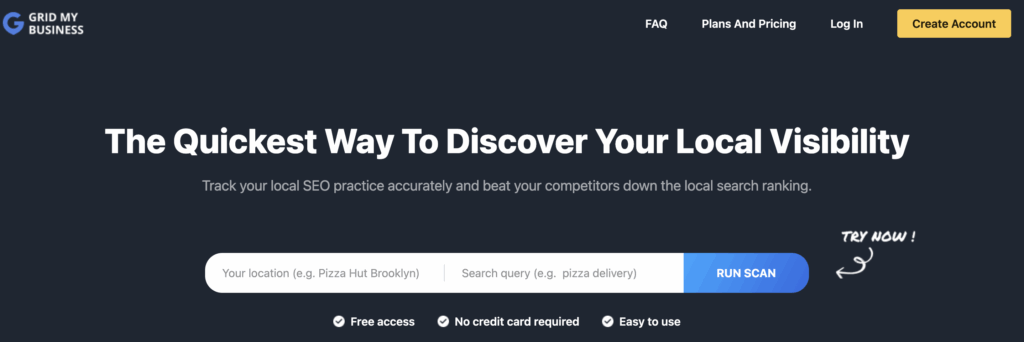
Best for: Local businesses and consultants who want a visual snapshot of in-town rankings.
Grid My Business isn’t exactly a lesson in versatility. It does one thing, but it does it really well: it gives you a color-coded, grid-based map of your local visibility on Google Maps, so you can instantly spot where you’re dominating the field and where you’re invisible.
I really like the setup on this tool because it shows you what local SEO actually looks like in the real world. It includes clear, bright visuals that don’t strain the eye or overwhelm with unnecessary features. If you appreciate fast and actionable insights, this is the winner.
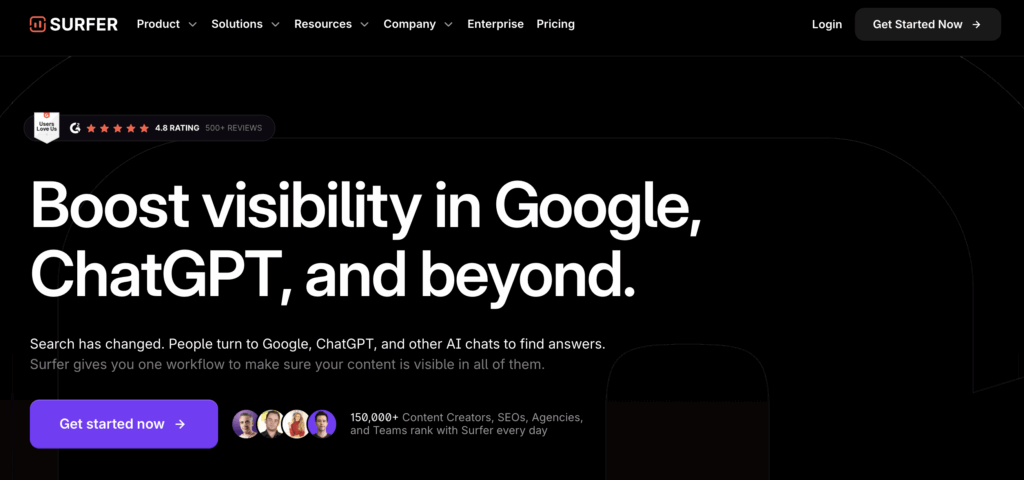
Best for: Small businesses and local SEO beginners looking for an easy-to-use local SEO tool.
Local SEO might be super-focused, but that doesn’t make it any easier. Surfer Local somehow manages to keep it beginner-friendly without compromising data precision and quality. If you’re not yet fluent in SEO jargon and you prefer bite-sized tips, I couldn’t recommend it more.
Surfer Local gives you clean heatmaps that point out spots where your Google Map visibility needs to be improved. What’s even better is that it tells you exactly how to improve it. If there is an ideal mix of local tracking and entry-level SEO insights, this tool by Surfer must be it.
Citations are the backbone of local SEO. If your business listings are anything less than consistent across directories, apps, and data aggregators, Google won’t see you as a legitimate source of information. And you know what that means for your local rankings – nothing good.
The problem is that you can’t keep up with citations manually because you can’t be everywhere at once, all the time. But these tools can. They can automatically sync your NAP (name, address, phone number) details and fix inconsistencies across hundreds of platforms at once.
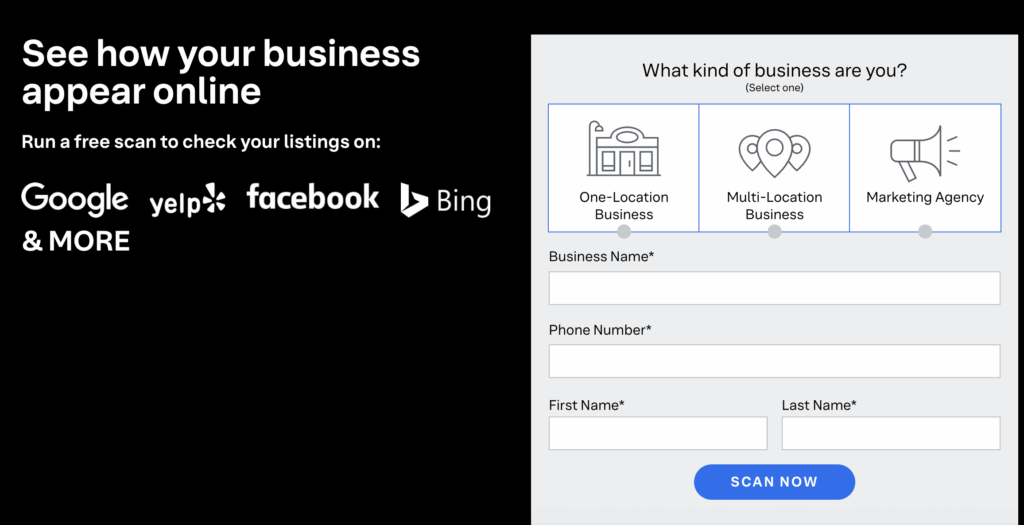
Best for: Large brands and franchises that need real-time citation management across a massive network.
In case you forgot, Yext is a phenomenal all-in-one tool for local SEO. I’ve already talked about this in the opening category. However, citation management has always been its strongest suit – and one of the absolute best on the market. So, it gets a double entry on my list.
Yext deserves to stand side-by-side with other citation management tools because it is able to handle the complex and ever-growing needs of enterprise-level local SEO. In a space where the tiniest inconsistency can hurt rankings, Yext has the power to move you up the ladder.
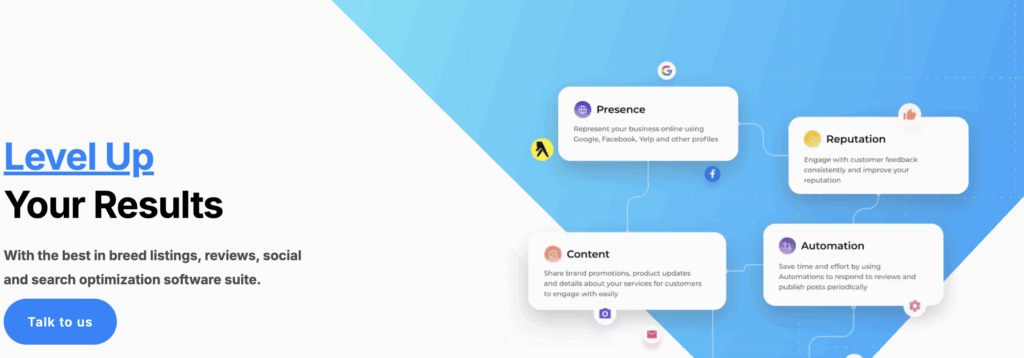
Best for: Businesses and agencies that want to automate citation distribution with monitoring.
Like smooth jazz, Synup’s citation management works quietly in the background, where it makes magic happen. The only thing you need to do is submit your business info, and it will make sure it’s distributed across major directories and scanned for possible discrepancies.
But what truly sets Synup apart is a competitor monitoring feature that helps you see where your rivals are listed. This hands-off combo of citation and review management is always super-effective – it keeps your local SEO strategy on point without wasting a single minute.
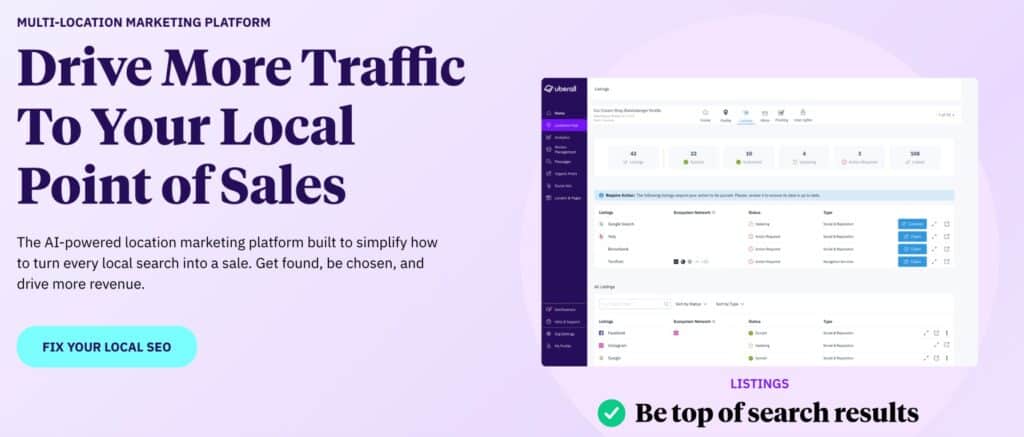
Best for: Multi-location businesses and enterprises that want to keep their listings accurate and their customers engaged in multiple places.
Accurately updated listings? Check. Review management? Check. What about customer engagement tools? Also check. Uberall is an excellent local SEO tool that specializes in citations, but also helps brands manage customer interactions through reviews and social posts.
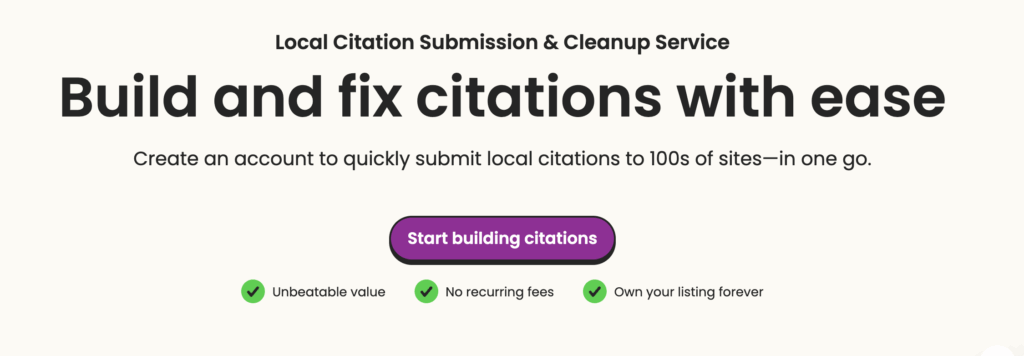
Best for: Agencies, freelancers, and local businesses that need flexible citation campaigns without a full subscription plan.
Do you want BrightLocal’s exceptional citation expertise but already have a tool that tracks your local rankings? No problem there, because BrightLocal offers a standalone Citation Builder to anyone in need of listings cleanup. You don’t have to pay for anything you don’t need.
Why choose BrightLocal and not another citation management tool? Because these guys submit all new listings manually and guarantee more control, better accuracy, and less risk of duplicate data. This level of service is a no-brainer for agencies handling lots of local campaigns.
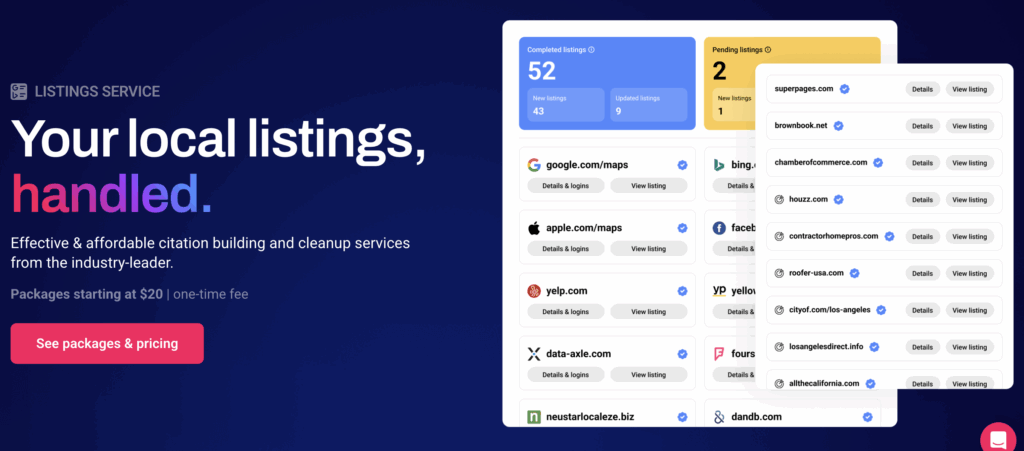
Best for: Businesses and SEOs who want handcrafted, high-quality citations.
Whitespark’s team writes every citation by hand. I always imagine they do it with a quill pen under the candlelight – a refreshing image in the AI era. But this is not only about branding; handwritten citations mean better quality control, fewer duplicates, and higher rankings.
Like BrightLocal, Whitespark charges citation management separately. You pay once, get results, and walk away with a detailed report showing exactly what was done and where. Whitespark also offers ongoing maintenance without ongoing fees: only $2 per listing.
When you’re competing on a local level, reputation is everything. Word of mouth and online reviews determine who rules the neighborhood – you or the other guy. You can’t control what people say about you, but you must be there to say “thank you” or “we’re sorry”.
That becomes more and more difficult as you scale, but that’s what the best local SEO tools for review monitoring and reputation management are for. It’s in their name, but let’s make it clear what they do: monitor, request, and respond to positive and negative feedback.
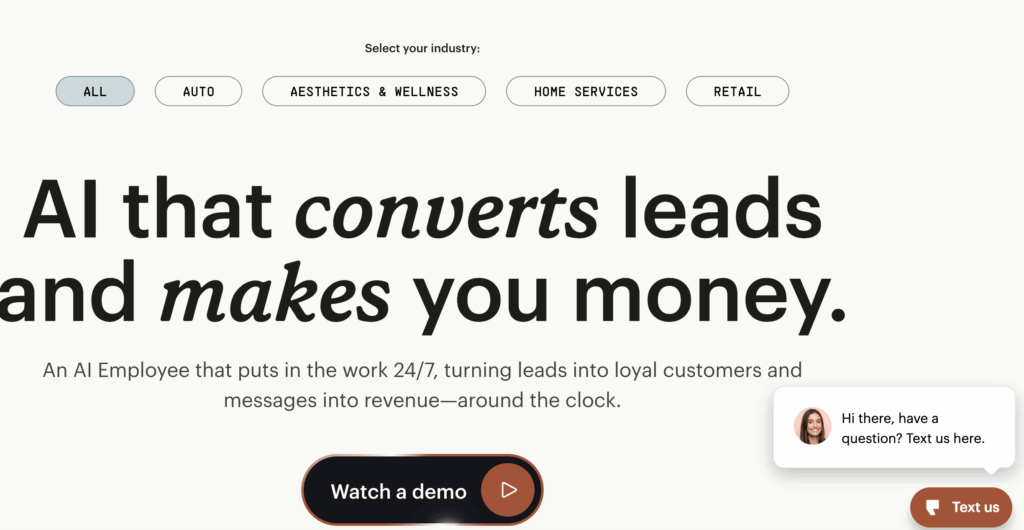
Best for: Local businesses that want to turn everyday customer interactions into positive reviews.
Podium is not an SEO tool per se, but a lead generation and management solution that’s changed the way businesses collect reviews. If you can’t make your customers write organic recommendations, Podium can – by hitting them with an SMS at the perfect moment.
On top of more reviews, social proof, and better ratings, you also get convenient e-commerce capabilities like payment tools, webchat, and lead capture built into a mobile dashboard that allows you to engage leads, answer questions, and boost conversions from your phone.
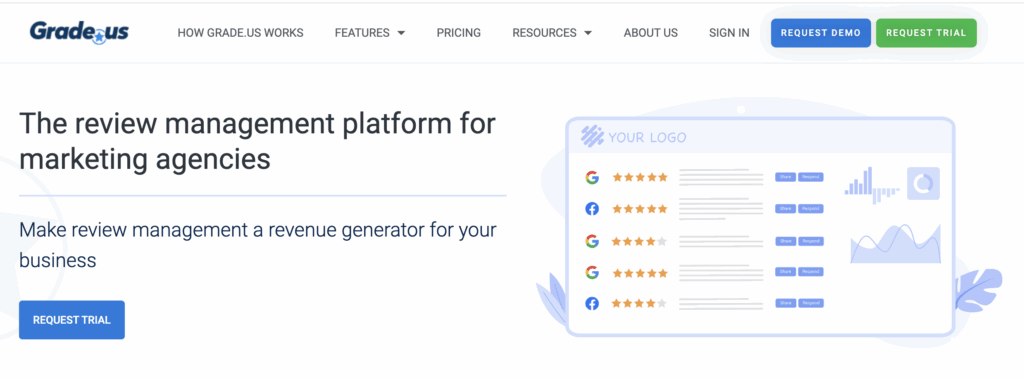
Best for: Agencies, franchises, and consultants who need tighter control over brand image.
Grade.us is a review generation machine for marketers tasked with brand building, social proof control, and reputation management. Its main capability is that it streamlines how businesses get and showcase reviews via email and SMS and on industry-specific platforms.
Here’s how that works: The platform prompts a review from a customer after the purchase. If the review is positive, it reroutes it to the best platform (restaurant reviews go to Yelp, hotels go to TripAdvisor, etc). What happens to negative ones? You deal with them in private.
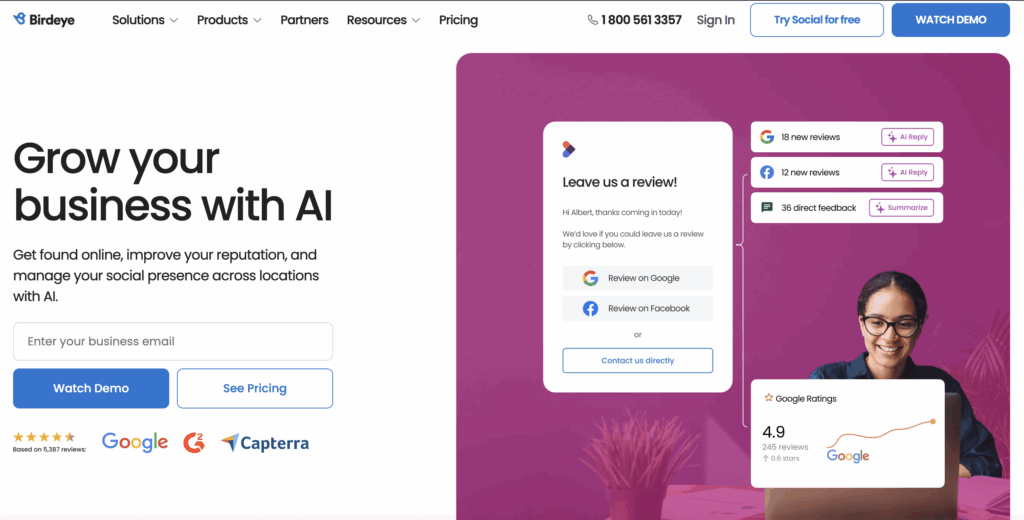
Best for: Local businesses that want an all-in-one platform for reputation management.
Birdeye goes beyond review generation to help you turn positive customer experiences into a local SEO advantage. It offers a range of different features, from automatic syncing for listings to sentiment analysis for reviews, that are designed to build your local image in 3D.
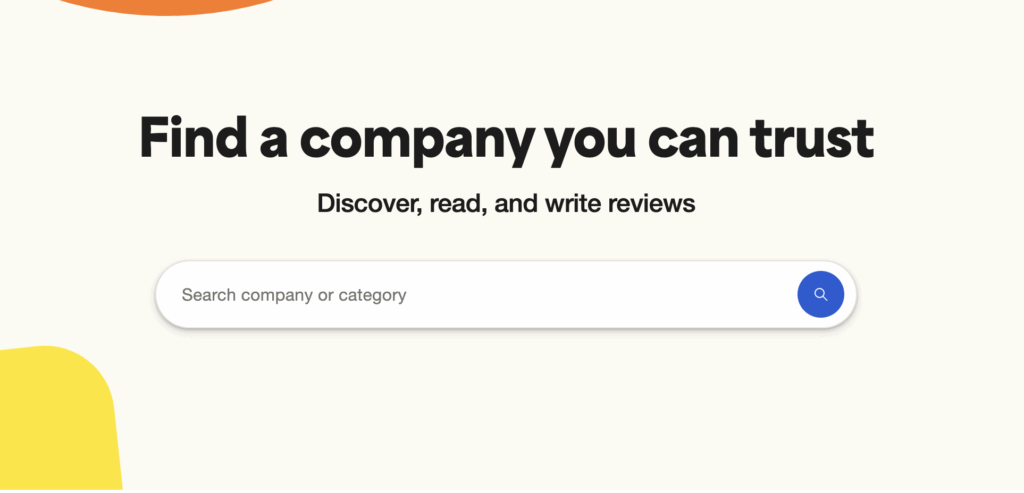
Best for: Businesses that want to build brand trust publicly using user-generated content.
Consumers trust Trustpilot for everything from hotel chains to legal firms, so having a five-star review there can’t hurt. Besides, it makes sure customer appraisals follow you around on SERPs and Google Ads, until they land on your product pages for everyone to see.
If this sounds good, wait because I’ve saved the best for last: public Trustpilot profiles actually rank in search with an extra boost from the platform’s own domain authority. Whether you’re trying to build trust or convert on social proof, you shouldn’t skip this one.
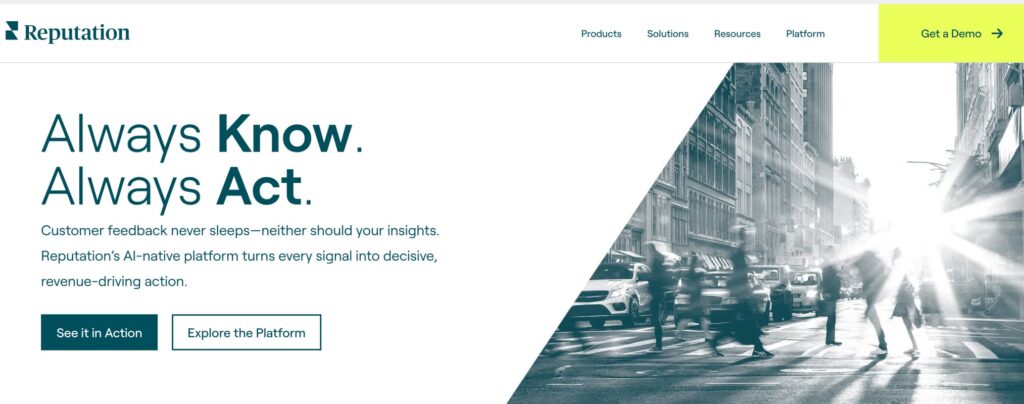
Best for: Enterprises and multi-location brands that need to centralize and monitor reputation at scale.
Imagine for a second you’re running a Pizza Hut with 10,000 locations all over the country. If you don’t have to imagine hard, you probably know all the challenges of enterprise and franchise-level local SEO and reputation management. Reputation.com can help you.
This platform gives you a real-time reputation score based on reviews, social buzz, and local visibility. You can unlock insight for specific regions or stores, respond to feedback, and even compare against closest competitors. It’s everything you need from a reputation hub.
Depending on their features and use cases, the best ttools for local SEO can cost anywhere between $20 and $1,500 a month for enterprise-grade solutions. But what if you don’t have that much? Is it possible to do local SEO and not pay for it? You’ll be surprised to hear this, but yes.
Before we continue, let’s make one thing clear: these tools can’t match the power and effectiveness of best local SEO software. Rather than a free alternative, they provide a core toolkit that local campaigns can’t do without – and that can’t be replaced by premium solutions.
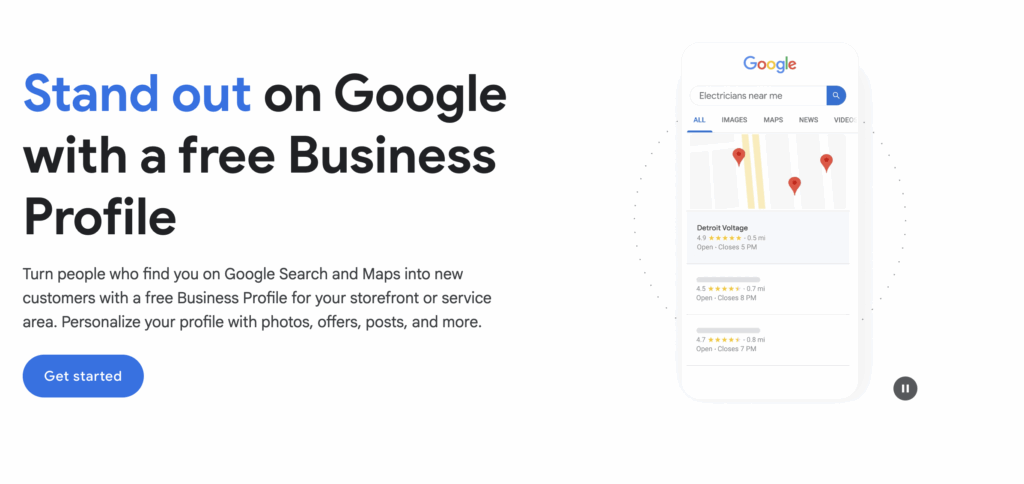
Best for: Every local business that wants to show up in Google Search and Maps.
Doing local SEO without a Google Business Profile is like opening a store and not putting up a sign. It doesn’t matter that you run a brick-and-mortar business, because people will still be looking for you online. Setting up a Google Business Profile will help them find you.
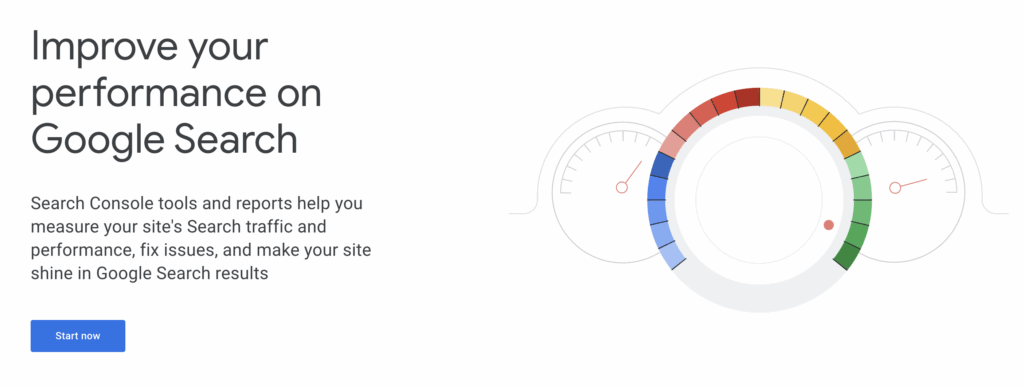
Best for: Site owners who want to track their local SERP performance.
If you want to know how you’re actually doing in local SERPs, leave it to Google Search Console to show you. Like Google Business Profile, Search Console is a local SEO essential; you might be able to get some customers without it, but they’ll probably be accidental walk-ins.

Best for: Businesses that want to capture local traffic from Bing users.
Less than 4% of people use Bing for online searches – that’s nothing compared to Google’s 89.66%. But wait: that’s a crowd of 100 million active daily users untapped by Google-based local campaigns. Bing Places is 100% free, and it’s simple to use, so I’d explore that.
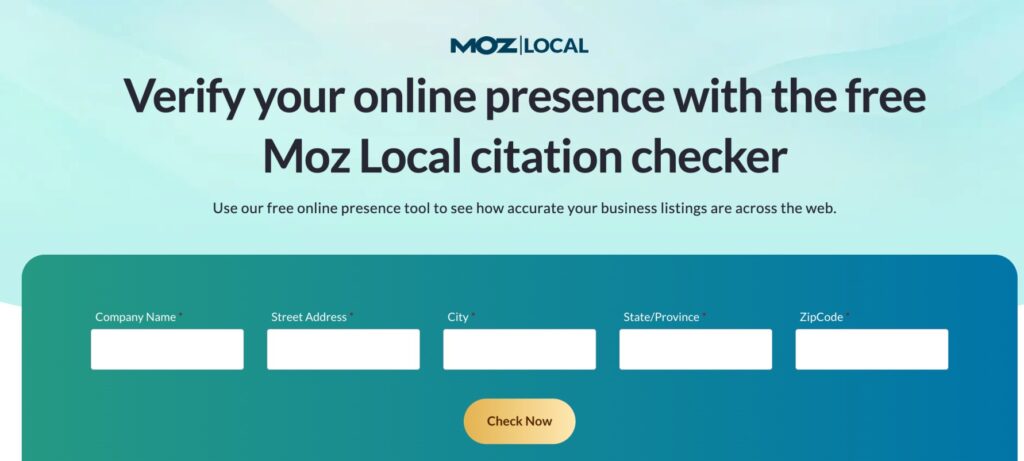
Best for: Businesses that want a quick and free way to audit their local citations.
Moz Check Listing is an extremely useful online tool that lets you check how your data appears across key directories. You just need to enter your business info, and it will generate a report with uncovered duplicates and all the bad data it fixed. Not too shabby for a $0 tool.
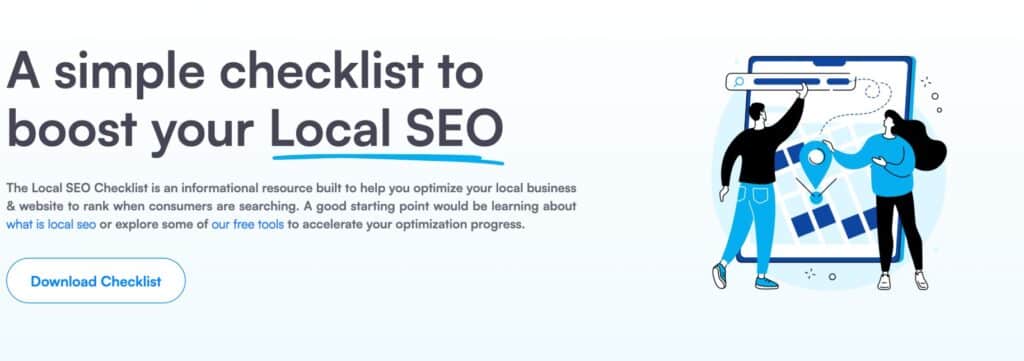
Best for: Small businesses and DIY marketers who need a local SEO checklist.
Right now, you might feel overwhelmed with choices. Don’t worry; there’s a tool for that, too. Local SEO Checklist is a brilliant online tool that will help you organize your needs, prioritize your tasks, and tell you what to do next. That’s how you’ll know what local SEO tool to pick.
The truth about local SEO is that there’s no one-size-fits-all solution. So, pick one tool from this list today and take action. Start tracking your visibility, fixing your citations, or asking for your 5-star reviews. You deserved them. The sooner you do, the sooner they’ll come flocking to your door. Chances are – your future customers are already searching. Make sure they find you.

You can’t get anywhere in 2026 as an entrepreneur without a well-optimized website. It doesn’t matter if you have a...


Getting site optimization right isn’t as simple as adding a few keywords and uploading a blog post every now and...


Setting up an SEO strategy takes time, and there are lots of details to go over, but sometimes you just...


If you want to advertise your services or sell products in this day and age, you need to drive more...


When you look at some of the biggest names in business, like Ahrefs and Semrush, the monthly subscription for even...


The right keyword generator can point you toward the topics that matter, whether you’re a beginner or already know your...
